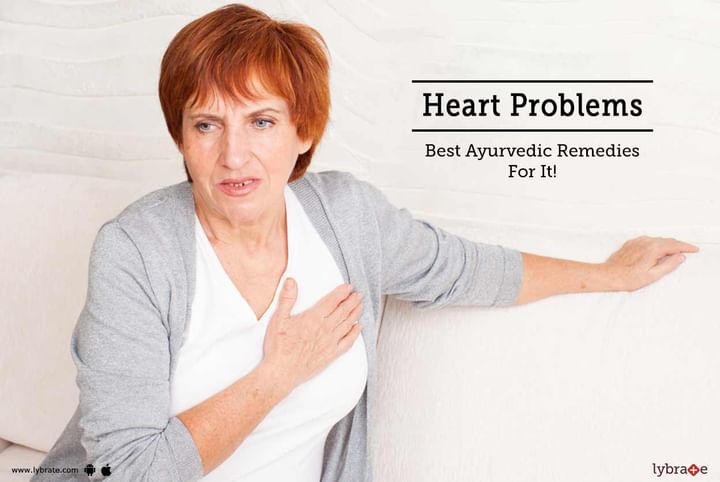Heart Problems - Best Ayurvedic Remedies For It!
The modern age is full of tensions and stress, expecting peaceful mind and healthy lifestyle is just impossible. To prevent common diseases and living a healthy life requires keen knowledge of the main organ of the body, that is the Heart. The heart is a muscular organ which works like an engine and provides fuel to run human body by pumping blood. Our heart has two chambers which separates the oxygen rich blood from oxygen poor blood and each time you breathe the valves of heart opens and closes. There are many cardiovascular diseases that are caused due to the blood vessel and heart issues like lack of flexibility, blockage, fatty plaques of the arteries or lack of strength of the parties.
The modern medical systems suggest surgical treatment for the cure of the heart problems but on another hand, Ayurveda targets the deep root cause of the disease. The best cure for heart diseases is to adopt a holistic approach named Ayurveda the part of the great Indian heritage. This is not only based upon the ancient principle but many researchers worked and proofed that heart issues are reversible with the help of Ayurvedic treatment.
Ayurvedic Treatment for Cardiovascular Diseases:
Depending on the pathology, the line of treatment is decided; Ayurveda treatments are supportive and supplementary to the mainstream conventional medicine. The treatment modalities includes panchakarma, external therapies, Activities, Advice of food and lifestyle changes.
Panchakarma, as the name suggests is a part of the Ayurvedic treatment that helps to detoxify the body by eliminating the toxic wastes through 5 steps -Vamana, Virechana, Nasya, Basti, and Raktamokshana. The organs such as lungs, stomach, bladder, intestine, or the sweat glands are usually used to eliminate the wastes out of the body. In doing so, panchakarma helps in establishing a balance between the various doshas (energies), leaving the body (physical as well as mental) fresh, relaxed and healthy.
Two things are a prerequisite before carrying out Panchakarma - Oleation and Fomentation.
- Oleation: Oleation is the application of oil (medicinal) throughout the body so that the goodness of the medicinal properties of the oil gains access to the body. This facilitates the treatment to a great extent and also ensures that the toxins (also termed as "Ama") that build up in the body tissues due to unhealthy lifestyle practices, eating habits, loosen up.
- Fomentation: Here the body is made to sweat profusely. The sweating goes a long way to liquify the toxins (softened by the sweat) which are eliminated via the sweat.
The steps of Panchakarma Treatment
- In Vamana, a person is given a medicine (emetic medicine) to vomit the toxins out of the body.
- Virechana is the step where natural or herbal laxatives are given to eliminate the wastes out of the body in the form of feces.
- In Nasya, a person is given a head and shoulder massage followed by Fomentation. Soon after, medicated nasal drops are administered through the nostrils to cleanse the head region.
- In Basti, the rectum is cleared of the toxins by the application of milk, ghee, herbal and medicated oil and decoction into the rectal area.
- Raktamokshana, as the name suggests is purifying and cleansing of the impure and toxic blood.
Panchakarma Treatment for Heart Problems
Five major procedures to eliminate the toxins from the body are popularly known as Panchakarma. The concept of cleansing the body is innate to Ayurveda and has been borrowed by allied sciences like Yoga. No other medical system in the world has the science of body-mind detoxification.
Panchakarma Treatment Therapies
- Phase 1 – Poorva Karma: Firstly, all the toxins are dislodged from where ever it is and brought to the gut by administering fats (oil or ghee) externally and/or internally followed by applying heat.
- Phase 2 – Pradhana Karma: Secondly, these are expelled out of the body by 5 procedures (Panchakarma)
- Vamana (Emesis)
- Virechana (Purgation)
- Vasti (Medicated Enema)
- Nasya (Nasal Medication)
- Raktamoksha (Blood Letting).
- Phase 3 – Pashchath Karma: Thirdly, the body has to be brought back to normal condition and rejuvenated starting with restricted diet and mild activity and gradually increasing it.
All the above three are equally important. But in Kerala Panchakarma therapy, equal importance is given to the first and third step also. We believe that if the proper accumulation of toxins are not done, the elimination procedure becomes namesake. Likewise, if importance is not given to after care, immunity of the person is affected. Panchakarma is undergone both as preventive and curative mechanism.



+1.svg)
